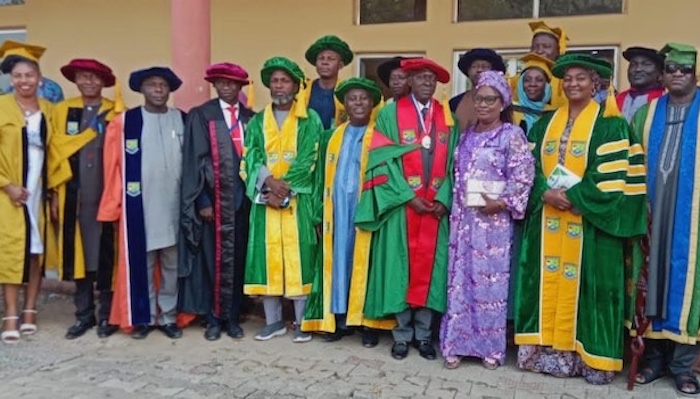
A university don, Professor Barnabas Embugus-Barde of the Department of Business Administration, Nasarawa State University, Keffi, has urged government at all levels to enact laws promoting the ethical use of modern technologies, warning that companies that fail to embrace digital tools risk becoming obsolete.
The call was made in Keffi during the institution’s 56th Inaugural Lecture, where Prof. Embugus-Barde advised business owners nationwide to invest heavily in technological solutions to enhance operations, sustainability, and overall performance.
Delivering the lecture titled “Business Administration in the Digital Age: Navigate the Impact of Business, Artificial Intelligence, Robotics, Data Analysis, and Entrepreneurship (BARDE)”, he stressed the need for organisations not only to adopt emerging technologies but also to train their employees to use them effectively. According to him, this is essential for boosting efficiency, remaining competitive, and preparing for the rising influence of Artificial Intelligence and robotics on the global workforce.
His words: “Businesses should understand the potential of each area and how they can be leveraged to create new opportunities and stay competitive. They must also be aware of the potential risks and challenges associated with each area and be willing to invest in research, development, experimentation, and innovation.”
Highlighting implications for business strategy, he noted that technology-driven systems can significantly improve decision-making, productivity, revenue generation and risk management. However, he cautioned that increased automation presents serious concerns for workers.
“AI and robotics are gradually taking away jobs from humans. Yes, artificial intelligence is taking over our jobs. Robotics are taking over our jobs. Employees must learn and equip themselves with relevant skills to remain useful in the workplace,” he stated.
He added that while data analytics can strengthen targeted advertising and product development, companies must ensure that employee well-being is not overlooked in the quest for automation.
“Businesses should carefully evaluate the potential benefits and challenges of incorporating these areas in their operations and address the potential risks while taking advantage of the benefits,” Embugus-Barde said.
He further asserted that entrepreneurship can enable organisations to build new digitally driven business models and revenue streams, noting that the workforce must also be prepared for displacement and evolving skill demands.
“The budget model represents a dynamic environment that requires businesses to stay informed and adapt quickly. By taking a strategic and holistic approach, businesses can improve operations, enhance customer experience, and achieve wealth maximisation objectives,” he concluded.
Earlier, the Vice-Chancellor of the university, Prof. Sa’adatu Hassan-Liman, represented by the Deputy Vice-Chancellor (Academics), Prof. Maikano Ari, commended the lecturer for delivering a timely and insightful presentation.
He said, “The presentation speaks to the realities shaping industries and the competences required for survival in a world driven by automation, digital intelligence, and innovation. Professor Barnabas embodies depth of intellect and a strong legacy of grooming future leaders in business and management sciences.”
Chairman of the Expanded Planning Committee and Senior Lecturer in the Department of Entrepreneurship Studies, Dr. Vincent Paul, also praised Prof. Embugus-Barde for his commitment to addressing key challenges facing business growth in Nigeria.
Ademide Adebayo


